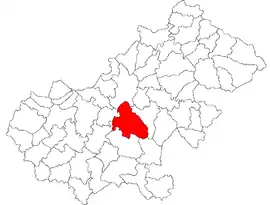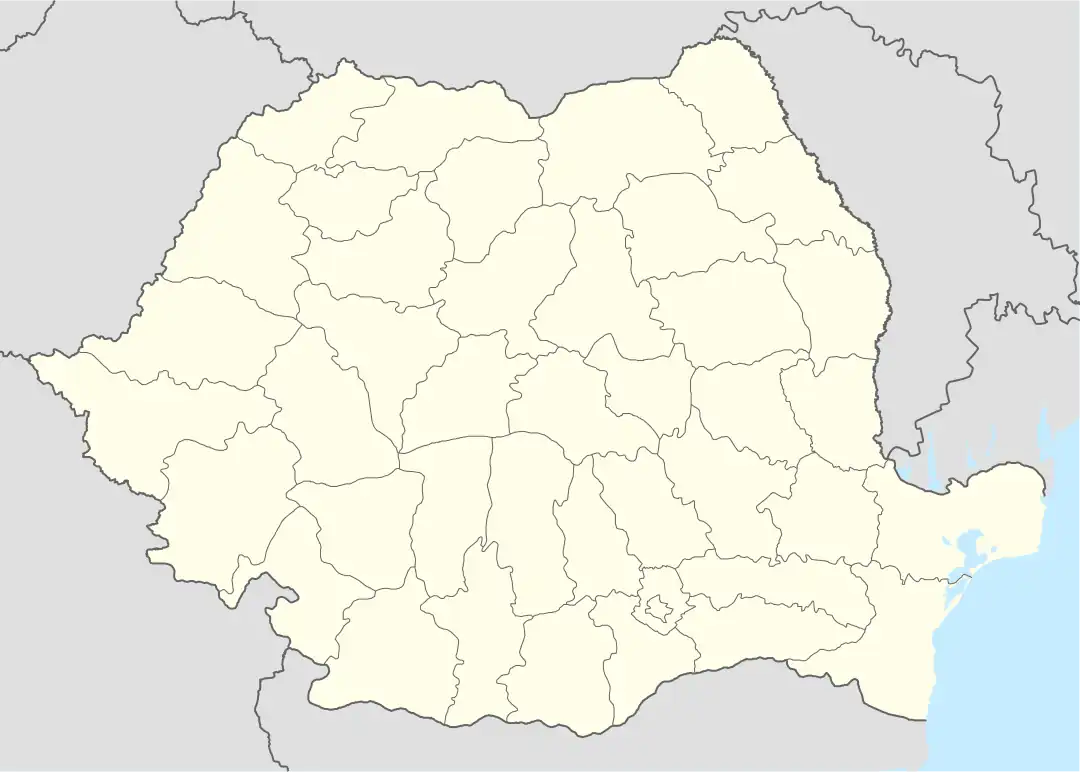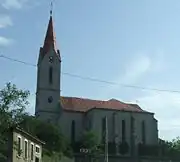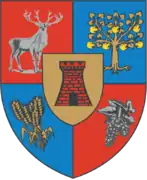Ardud | |
|---|---|
 Ardud fortress | |
 Coat of arms | |
 Location in Satu Mare County | |
 Ardud Location in Romania | |
| Coordinates: 47°38′N 22°53′E / 47.633°N 22.883°E | |
| Country | Romania |
| County | Satu Mare |
| Government | |
| • Mayor (2020–2024) | Ovidiu-Marius Duma[1] (PNL) |
| Area | 142.63 km2 (55.07 sq mi) |
| Elevation | 148 m (486 ft) |
| Population (2021-12-01)[2] | 6,124 |
| • Density | 43/km2 (110/sq mi) |
| Time zone | EET/EEST (UTC+2/+3) |
| Postal code | 447020 |
| Area code | (+40) 02 61 |
| Vehicle reg. | SM |
| Website | orasardud |
Ardud (Hungarian: Erdőd, Hungarian pronunciation: [ˈɛrdøːd]; German: Erdeed) is a town situated in Satu Mare County, Transylvania, Romania. It administers five villages: Ardud-Vii (Erdődhegy), Baba Novac (Lajosmajor), Gerăușa (Oláhgyűrűs), Mădăras (Nagymadarász), and Sărătura (Sóspuszta).
History
The town has a complex history, having in different periods been part the Kingdom of Hungary, Ottoman Empire, Habsburg monarchy, and the Kingdom of Romania.
After the collapse of Austria-Hungary at the end of World War I, and the declaration of the Union of Transylvania with Romania, the Romanian Army took control of Ardud in April 1919, during the Hungarian–Romanian War. The city officially became part of the territory ceded to the Kingdom of Romania in June 1920 under the terms of the Treaty of Trianon. In August 1940, under the auspices of Nazi Germany, which imposed the Second Vienna Award, Hungary retook the territory of Northern Transylvania (which included Ardud) from Romania. Towards the end of World War II, however, the city was taken back from Hungarian and German troops by Romanian and Soviet forces in October 1944.
Demographics
| Year | Pop. | ±% |
|---|---|---|
| 1869 | 4,357 | — |
| 1880 | 4,071 | −6.6% |
| 1890 | 4,926 | +21.0% |
| 1900 | 5,742 | +16.6% |
| 1910 | 6,302 | +9.8% |
| 1930 | 7,313 | +16.0% |
| 1941 | 8,047 | +10.0% |
| 1992 | 6,572 | −18.3% |
| 2002 | 6,486 | −1.3% |
| 2011 | 5,889 | −9.2% |
| 2021 | 6,124 | +4.0% |
| Source: Census data[3] | ||
At the 2021 census, Ardud had a population of 6,124.[4] The 2011 census recorded a total population of 5,889; of these, 59.2% were Romanians, 18.6% Hungarians, 16.1% Roma, and 4.8% Germans.[5] In 2002, 41.7% were Romanian Orthodox, 32.7% Roman Catholic, 13.9% Greek-Catholic, 5.1% Pentecostal, 4.2% Reformed and 2.3% Baptist.[6]
Notable residents
- Sándor Petőfi married Júlia Szendrey in Ardud.
- Ardud is the hometown of Hungarian archbishop, cardinal and statesman Tamás Bakócz.
In popular culture
The 2022 drama film Sparta was filmed in Germany, Austria, and Romania. Filming in Romania took place in the winter of 2018–2019 and the summer of 2019, the primary location being the village of Baba Novac in Ardud.[7]
International relations
Ardud is twinned with:
 Trevoux (1990)
Trevoux (1990) La Martyre (1992)
La Martyre (1992) Szakoly (2004)
Szakoly (2004) Napkor (2005)
Napkor (2005) Velyki Berehy (2005)
Velyki Berehy (2005)
References
- ↑ "Results of the 2020 local elections". Central Electoral Bureau. Retrieved 8 June 2021.
- ↑ "Populaţia rezidentă după grupa de vârstă, pe județe și municipii, orașe, comune, la 1 decembrie 2021" (XLS). National Institute of Statistics.
- ↑ Census Database
- ↑ "Populația rezidentă după grupa de vârstă, pe județe și municipii, orașe, comune, la 1 decembrie 2021" (in Romanian). INSSE. 31 May 2023.
- ↑ 2011 Romanian census data
- ↑ Romanian Government Department of Interethnic Relations (in Romanian) Archived July 17, 2011, at the Wayback Machine
- ↑ Beier, Lars-Olav; von Laffert, Bartholomäus; Müller, Pascale; Marinescu, Delia (2 September 2022). "Accusations of Child Exploitation Haunt Austrian Filmmaker Ulrich Seidl". Spiegel International. Retrieved 19 October 2023.
 View of Ardud from the fortress (2012)
View of Ardud from the fortress (2012) Church in Ardud
Church in Ardud Aerial view of Sărătura village
Aerial view of Sărătura village
